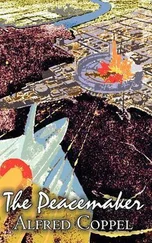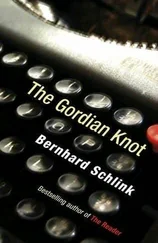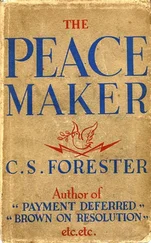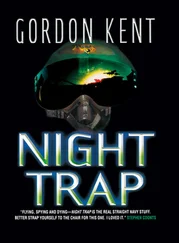1 ...8 9 10 12 13 14 ...31 “Lieutenant?”
He looked up. Way up. A very tall, emaciated man in civilian clothes. The man folded himself into pieces and brought his head down to Alan’s level and said, “You look for me, they say.” He had a bony, almost skull-like face, and skin cratered by illness or acne long ago. “I am Marco. Translator?”
“Ah.” Right. That made sense. But why? Aha. Translator, yes. Alan held up a finger. “Momento,” he said, forgetting that Italian was not the language in question. Where had he put it? He patted himself, finally found it in the buttoned breast pocket of the Italian shirt he was wearing. Took it out with great care and unfolded it, presenting it to Marco so that the slightly frivolous backside, showing incomplete but naked female parts, was hidden. It was the picture of the man in camos he’d taken from the bedroom in the house. “What’s that say?” he asked. At least that was what he hoped he asked.
Marco squinted. “Says, ‘Colonel Zulu at the Battle of the Crows.’”
“What’s that mean? ‘Battle of the Crows’?”
Marco scratched his ruined chin. “Aaah. Well. It’s the Serbs, you see? The Battle of the Crows—hmm. Well.” He sighed. “It happened six centuries ago, okay?”
That was not okay at all. That made no sense. What was this guy, drunk or something?
Detroit.
Radko Panic dropped his heavy coat on the floor, not even thinking, knowing she would hang it up later, if she knew what was good for her, and glanced out of habit at the crappy little table where she put the mail. Bills, junk, ripoffs, he expected, the same as always, but there was a package and his heart jumped. Even the fact that it was different was enough, but there was the color of it, too, and the feel of the paper under his fingers and the string that held it together. The old days. That rough brown paper, that hairy string—relics, he knew now, of a technology he had left behind when he had left the old places. The postmark was French, but he knew it did not come from France.
She had left his meal for him and he shoved it into the microwave and pushed buttons without thinking, his face split by a big grin. Rare, that grin. Really rare. He saw himself in the microwave window. He’d had a couple on the way home at the Rouge Tap; the grin, pasted on the microwave as if it belonged to the machine and not to him, was happy. Well, why not? A man deserved to be happy.
He took one of her knives and cut the string. He had surprisingly delicate hands for a big man, but he was a precision toolmaker, did things well, deftly, when he was sober. He slit the tape-shiny ends and slid out the box inside, made of a thin cardboard of the kind that used to come inside shirts. It too was held with tape, and he cut that and put her knife aside, thinking without thinking that the knife was getting dull and what the hell had she been doing with it, sharpening pencils again?
Inside was a photograph and something else. He slid the photo out. He left the something else, like the prize in a Crackerjack box. There had still been Crackerjack boxes when he had first come to America. He had loved them.
The photo, grainy and a little washed-out, showed a man in camo fatigues, one hand raised over his head, an automatic rifle in the raised hand. It was too fuzzy to see what kind of rifle it was. At the man’s feet was something dark, a bundle, a pile, a—what?
He turned the photo over. Big, black letters said, “YOUR BOY AT THE BATTLE OF THE CROWS!!!!”
She came in behind him then; he heard her, didn’t even turn, didn’t speak. He grinned at the back of the photo. He had heard the expression “bursting with pride,” knew now what it meant. He thought he was going to explode with it.
The microwave dinged and she said something and he grunted at her, and she got the food out and began to arrange it at the place she had already set for him. Her hair in some kind of thing, an old bathrobe clutched around her, her face gray, soft, lined, purple shadows under the eyes.
“Is it—from—?” She had had a sweet voice as a young woman; now it was wispy. She was afraid of him. With good reason.
He thrust the photo at her. He sat down and picked up the fork and filled his mouth. Seeing her standing close by, he waved her away and she went over to the sink and held the photo up under the light.
He thrust another forkful into his mouth and then put a long finger down into the narrow box and took out the small thing that was in there. It made him grin again. It was a human eyelid.
February – April
The succession of naval fleets that guard the Mediterranean is like the turning of a great wheel. Always, at the top, is the fleet in place—one nuclear-powered aircraft carrier, most potent of the weapons in the world, on which the commanding admiral flies his flag; two guided-missile cruisers; destroyers and frigates and submarines; and, around and behind them, support and repair and fueling ships. These ships are six months on station—six months at the top of the wheel—with tenuous lines of communication to the land, to be sure, but alone at sea as ships have always been alone at sea. Then the wheel turns, and the battle group on station turns its bows and heads for the Pillars of Hercules, Gibraltar, and at the same time the fleet that has been forming and training on the east coast of the United States puts to sea and begins its voyage to the top of the wheel. The wheel turns, and the new fleet takes its place on station, and the old fleet goes into port at Norfolk, while another fleet trains and forms and readies itself to sail in six months more. And behind it, at the bottom of the wheel, another fleet exists as an idea and a skeletal organization; it will not sail for a year, but already its flag-rank commander is in place with his most important senior officers; the air squadrons that will deploy with the carriers are designated; ships and ships’ companies know where they will be. And even as the wheel turns, other fleets exist, phantom or hypothetical fleets, ideas of fleets that will come into being in eighteen months or two years or five or ten. Other crisis areas, or areas of strategic interest, have their own wheels—Korea, for instance, or the Persian Gulf. Sometimes one area has several wheels.
The wheel turns, and forward into time the fleets move toward their place on the wheel and the six-month period for which they exist: the presence of a battle group in the Mediterranean Sea. It is a figure of life—of coming into being and of going; of being born, and of dying; of existing only as an idea of the future and as a memory of the past.
The battle groups come and go. It is the wheel that is important.
Vice-Admiral Richard Pilchard commanded Battle Group Four. Battle Group Four served off Bosnia, drilled holes in the Adriatic, had liberty in Trieste and Naples. They won no glory, but they held the line, and their aircraft sent a message. Now Battle Group Four is split back into its component ships, in Norfolk, Charleston, Mayport, and Newport.
Vice-Admiral Nathan Green commands Battle Group Five, now on station off Bosnia; it changed its name when it arrived on station and became Task Force 155. It has a NATO name, too, but most people will keep calling it Battle Group Five, or BG 5.
Vice-Admiral Richard Toricelli commands Battle Group Six, now training in the Norfolk area. Vice-Admiral Rudolph Newman will command Battle Group Seven and is organizing his staff. Vice-Admiral Harold Rehnquist will command Battle Group Eight but has only just received those orders and will not sail for almost eighteen months.
Alan Craik is the Assistant Carrier Air Wing Intelligence Officer for BG 5, which is at the top of the wheel. On station. If not facing the animal, then at least very sensitive to its presence.
Читать дальше












